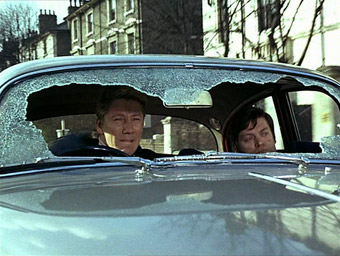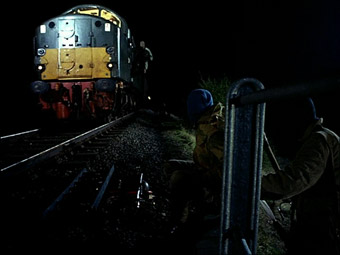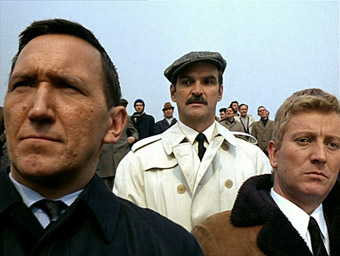|
It seems a little absurd that a film could be criticised for the excellence of its opening scene, but such is the fate that has befallen the 1967 British crime thriller Robbery in some quarters. And it really is a cracking start, one that was to transport its director Peter Yates to Hollywood a year later at the specific request of a certain Steve McQueen, who was impressed enough with his handling of this sequence to want him at the helm of his latest project, Bullitt, and what was to become the most famous car chase in movie history.
Robbery begins with the successful execution of a risky but intriguing plan to steal diamonds from their appointed guardian. Unfortunately for the robbers, they are spotted changing vehicles and the police are soon on their tail. What follows must rank as one of the most thrillingly filmed car chases in British cinema history, a brilliantly shot and edited hurtle through London streets that really is edge-of-seat stuff. Even the plausibility lapses (it's unlikely the two gang members who jump from the vehicle would have escaped serious injury at that speed) are so well handled that they fail to dent the overriding realism of the sequence. And there are a couple of moments here – the extraordinary in-car shot in which a beat policeman smashes the windscreen of the vehicle as it passes – that even 40 years on remain unique to this film.

So how could anyone complain about such an opening? Well it's not the sequence itself that appears to have irked the critical, but that it's a one-off. A common trait of modern action movies is for the opening scene to function almost as a trailer for business to come, a promise that if you sit still for the required plot and character setting scenes, then there'll be more of the big stuff later, only next time it'll be even louder and faster and longer. Robbery doesn't do that. Here, the scene serves its purpose and once it's over, it simply does not need repeating. To some modern action fans this will play as something of a cinematic prick-tease. So know in advance that it's the only such sequence and enjoy the rest for what it is, an atmospheric, realistic, and meticulously detailed caper movie that bears more than a passing resemblance to one of the most famous true-life robberies in UK history.
The film documents the planning, preparation and execution of the robbery of the Glasgow to London night mail train, a job that is funded by the opening diamond haul and is expected to net up to three million pounds. It's been organised by fresh-from-jail criminal gang leader Paul Clifton (a typically but most appropriately hard-nosed Stanley Baker), the plan itself having come from the still banged-up Robinson (an almost unrecognisable behind-the-glasses Frank Finlay). The scale of the job leads to a number of complications, the necessary manpower forcing Clifton to strike a deal with two other criminal firms, who bring conditions that deviate from his careful planning, and Robinson's specialist knowledge requires that he be boosted from jail.
One of the film's real strengths is that problems are dealt with as they arise and in a professional manner, with compromise always tempered by a degree of good sense. Clifton's gang (themselves a collection of familiar faces from the period, including Barry Foster and William Marlowe) are a loyal and tight-knit crew who all know their jobs, and it's only through the involvement of outsiders that the inevitable weak links emerge, plot developments whose element of disappointment come partly from their overuse in the years that followed. Hot on the gang's tail, meanwhile, is inspector George Langdon (James Booth), a patient and methodical cop who appears to work as much on intuition as he does on the facts of the case and his almost intimate knowledge of the criminals on his patch.

The pleasure, as with any good caper movie, comes from the details of the plan's preparation and execution, a process that is almost never sidelined by personal issues – only Clifton's home life is briefly shown and even then it's to establish his personal motivation and to set up a key post-robbery scene. Although both the crime and its investigation are given enough screen time for the audience to be interested in both parties, Yates aligns us from the start with Clifton and his boys (no easy feat given that they recklessly barrel through a party of schoolchildren during the opening getaway), to the extent that their post-robbery near discovery by an army helicopter is almost nail-bitingly tense, filmed as it is almost entirely from their viewpoint and with the hovering helicopter taking on the coldly predatory aura of a War of the Worlds alien ship.
The inspiration for the story, of course, is the 1963 Great Train Robbery. Although the film plays some speculative games with the build-up and goes its own way when it comes to tracking the villains down, the robbery itself is slavishly faithful to its real-life counterpart, right down to the gang's decision not to use guns, the sabotaging of signals to bring the train to a halt, and the hiccup caused when the man hired by the gang to drive the locomotive found himself unfamiliar with its controls.
The car chase may be Robbery's most celebrated scene, but its enduring appeal comes as much from its sober approach, its low key performances and its attention to character and detail as this attention-grabbing opening. This combination of elements, and the fact that it tells a rattling good story, has ensured that it has not dated in the manner of many of the British crime films and TV series that followed, where mouthy, argumentative villains and cops were to later become the object of cliché and parody. Like the robbery itself, this is a slick, well planned and professionally executed job.
Douglas Slocombe's lovely night-time photography has been cropped to 4:3 here by Optimum's European parent compny, Studio Canal. It's hard to be sure what the original projected aspect ratio was, but the one supplied here seems unlikely for 1967, with 1.66:1 the likely candidate (check out the slight tightness on faces on the grab below). The good news is that the cropping does little harm to the compositions, and the really good news is that in all other respects the transfer is impressive, with crisp detail, near perfect contrast, strong colour reproduction and solid black levels. small traces of dust and dirt are visible, but they are never distracting. 
The Dolby mono 2.0 soundtrack has the expected dynamic range limitations but is otherwise clear of noise and free of background hiss.
Not a thing, unfortunately.
A solid, well performed and impressive restrained British crime thriller with some standout scenes, not least that opening chase and the robbery itself. Optimum's DVD is shy of extras and it looks likely the picture has been slightly cropped, but the transfer is impressive and for the film and the image quality alone the disc has to come recommended.
|